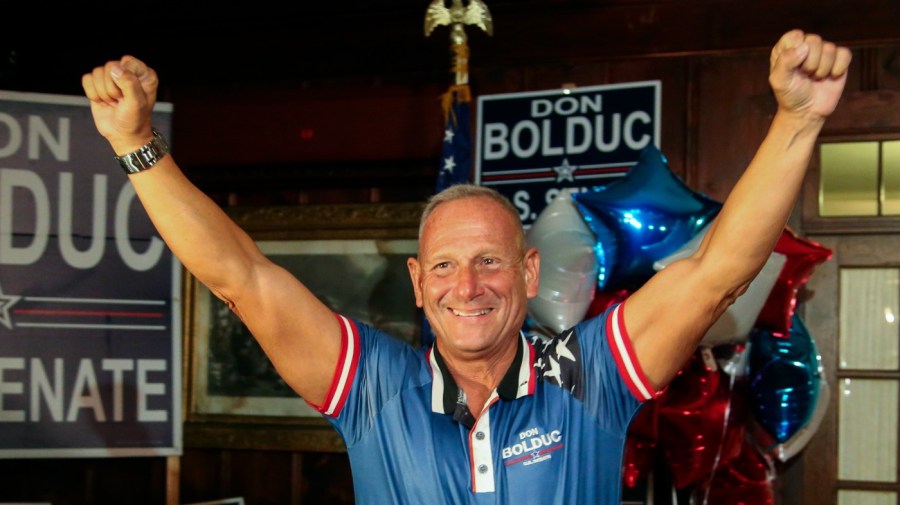New evidence shows GOP’s Trump problem may be getting worse
Republicans are growing more concerned that President Trump could be a drag — and not a help — in tight midterm races that will determine the majorities in the House and Senate.
Trump remains overwhelmingly popular among Republican voters, but he’s just as unpopular with Democrats, and there is a growing body of evidence that he is losing more support from independent swing voters as he grapples with a slew of investigations.
A new NBC News poll released Sunday found just 34 percent of registered voters said they have a positive view of Trump, compared to 54 percent who said they have a negative view of him. That’s the lowest Trump has polled in NBC’s survey since April 2021.
While Trump has defended himself since the FBI conducted a search of his Mar-a-Lago estate for classified records, the controversy appears to be hurting him.
A Quinnipiac University poll conducted in late August found half of Americans think Trump should be prosecuted over his handling of classified documents after leaving the White House, including 52 percent of independent voters.
An NPR-Marist poll released on Sept. 7 found 67 percent of independents say they don’t want him to run for president again.
And in another indictment of Trump’s standing with moderate voters, a New York Times-Siena survey conducted earlier in September found him trailing President Biden in a hypothetical rematch by 3 percentage points, despite just 39 percent of independents in that poll saying they approve of Biden’s job performance.
“These candidates have to fight kind of two-fold battles,” said John Thomas, a Republican strategist. “Can you move your base turnout margin ever so slightly? I think Trump has utility there. And can you win with independent swing voters on issues that aren’t Trump-related?”
Trump won’t be on the ballot this fall, but he’s closely associated with GOP Senate candidates Herschel Walker, Blake Masters, J.D. Vance and Mehmet Oz, all of whom got across the finish line in their respective Senate primaries with the former president’s support.

Senate candidate JD Vance, left, greets former President Donald Trump.
As a result, it’s possible those candidates could be hurt by Trump as they seek to move to the middle for the general election.
Trump, who held a rally in Ohio on Saturday for Vance, pushed back strongly at any suggestion he isn’t helping GOP candidates.
He also held a recent rally in Pennsylvania and plans to hold similar events in Michigan and North Carolina.
“Both J.D. Vance and Dr. Oz asked me to do big Rallies for them in Ohio and Pennsylvania, respectively, and I did,” Trump wrote in a post over the weekend on Truth Social, his nascent social media platform.
“The Pennsylvania Rally was a massive success, ‘packed’ with great American Patriots, and the Ohio Rally … is a likewise sold out juggernaut — Look at the massive crowds,” Trump wrote.
“Both candidates wanted this and I, as usual, delivered,” Trump continued. “ALL Republican candidates want Rallies. Without the Rallies and, even more importantly, the Endorsements, most would lose. MAKE AMERICA GREAT AGAIN!!!”

Pennsylvania Republican Senate candidate Mehmet Oz, left, is joined by former President Donald Trump at a rally in Wilkes-Barre, Pa.
A former Trump campaign aide argued Trump’s value depends on the state, pointing to Ohio and Georgia as redder states where he helped earn Vance and Walker the nomination and could make a difference in a general election.
But in more purple states such as Arizona, New Hampshire and Pennsylvania, the former aide acknowledged, Trump could ultimately be more of a drag.
One GOP strategist in Arizona expressed skepticism about whether Kari Lake and Blake Masters, the Republican gubernatorial and Senate candidates, respectively, would be able to expand their appeal beyond hardcore Trump voters to win in a state that sent Sen. Kyrsten Sinema (D) to Washington and narrowly backed Biden in 2020.
There’s no doubt Trump is popular with the GOP base, and few Republicans will want to send any signals of criticism toward him. A USA Today-Ipsos poll in late August found Trump had an 81 percent approval rating within the Republican Party.
“J.D. is kissing my ass. He wants my support,” Trump said in Ohio on Saturday, arguing that wouldn’t be the case if he were politically toxic.
But Republican candidates will have to overcome a trend of Trump voters failing to turn out in droves when the former president is not on the ballot. Enthusiasm for Trump carried him to the White House in 2016 and earned him more than 74 million votes in 2020.
Republican turnout dipped in 2018 without Trump on the ticket, and the party lost its House majority. Trump was again not on the ticket in early 2021 when two Georgia Senate seats went to Democrats in runoff elections.
Some Republican candidates who hugged Trump closely in primary races have already tried to pivot away from the former president on certain issues, especially around the 2020 election.
Dan Bolduc, a GOP Senate candidate in New Hampshire who insisted as recently as August that Biden was illegitimately elected in 2020, made a complete reversal after winning his primary last week, telling Fox News he had concluded after talking to voters “the election was not stolen.”

Bolduc won his New Hampshire primary last week.
Oz, who with the help of Trump’s endorsement emerged from a crowded primary field in Pennsylvania’s Senate race, said earlier this month he would have voted to certify Biden’s victory. Trump and many of his supporters remain outraged that then-Vice President Mike Pence certified the Electoral College results on Jan. 6, 2021.
Biden won New Hampshire in 2020 by roughly 60,000 votes, and he won Pennsylvania by roughly 80,000 votes.
Democrats have been happy to take advantage of Trump’s prominent role in the midterm elections, believing his lack of appeal with independent voters and the cloud of investigations hanging over him make it possible to turn the vote into a referendum on the former president rather than the current one.
In a memo late last week, Nevin Nayak, president of the Center for American Progress Action Fund, wrote that so-called MAGA Republicans, or those who are part of Trump’s “Make America Great Again” movement, have turned off voters with extreme views on abortion, election security and other issues.
“With the primary season having concluded … the general election is officially upon us,” Nayak wrote. “The dangerous MAGA agenda is giving voters a very clear choice this November — and that’s causing major headaches for the Republican Party.”
Copyright 2023 Nexstar Media Inc. All rights reserved. This material may not be published, broadcast, rewritten, or redistributed. Regular the hill posts
Video/Hill.TV










